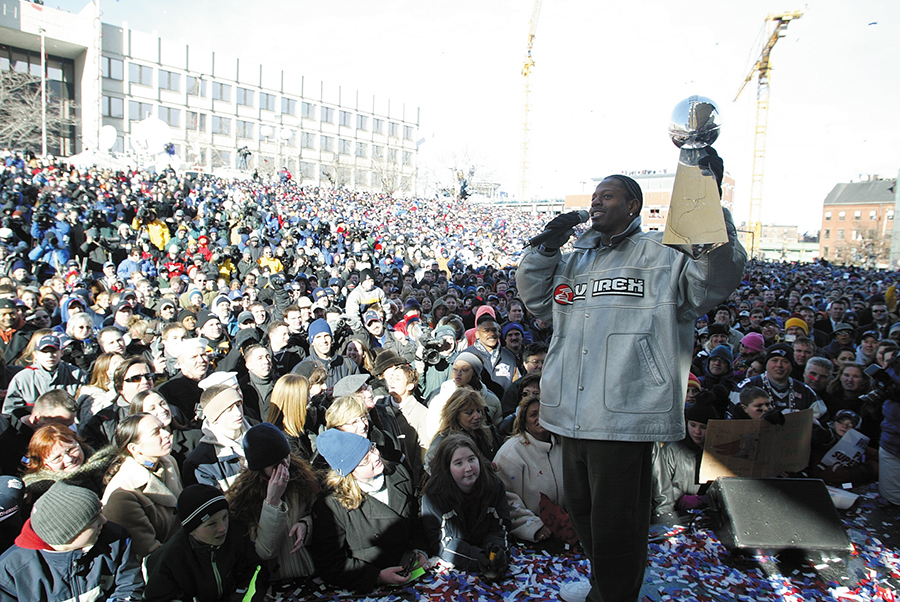Huntington resident and former Marshall standout Troy Brown captures Super Bowl glory
By Tim Stephens
HQ 44 | SPRING 2002
When Troy Brown arrived in Huntington in 1991, he brought with him a duffel bag and a 9 inch television set. He smiles at the memory.
“I think Troy had everything he owned in that bag,” said Phil Ratliff, Brown’s former Marshall football teammate and the Head Coach at Spring Valley High School.
Times have changed. Brown, a former Marshall star and current all-Pro wide receiver with the New England Patriots, hasn’t. His southside home is more accommodating than was his MU dorm room. The TV is in color, unlike the one he brought with him from his hometown of Blacksville, S.C. A five-year, multi-million dollar contract allows Brown to afford virtually anything he wants. Brown says he already has what he wants a loving wife, Kim, and children Sir’mon, 3 and Saanjay, 19 months. Throw in a Super Bowl ring, an NFL player’s ultimate goal, and Brown wants for nothing.
The fact that Brown, the most valuable player on Marshall’s 1992 NCAA Division I-AA national championship team, chose to settle in Huntington, a place that 12 years ago he never knew existed, is a compliment to the city.
“This is a great place to raise a family,” Brown said. “I’m very touched by the people here. It’s my home. I love it here because of the people. They’ve been absolutely great to me. It feels good to come back here and see all of the people I know.”

Brown has been great in return, generously helping with the Huntington Area Boys and Girls Clubs and participating in football camps for youngsters. He has been known to sign autographs by the hundreds without complaining.
“I feel like I should give back to the community,” Brown said. “I’ve been blessed.”
A modest superstar, Brown caught 101 passes for 1,199 yards and five touchdowns last season. He almost single-handedly beat the Pittsburgh Steelers in the AFC playoffs, returning a punt 55 yards for a touchdown and setting up another with a recovery on special teams. Brown also starred in the Super Bowl upset of the St. Louis Rams.
“I got a lot of good blocks,” Brown said, deflecting credit for his performances against the Steelers and Rams.

Brown’s biggest fan is his wife.
“Troy’s a great husband,” Kim Brown said. “He’s a great father to our children. I couldn’t ask for anyone better.”
Brown might well be the NFL’s ultimate success story. Selected in the eighth round, a round that no longer exists, of the 1993 draft, Brown caught two passes in his first two seasons. At 5-foot-10, 180 pounds, Brown was considered too small by NFL standards. His 4.5 second time in the 40-yard dash was deemed too slow. The Patriots waived Brown after two seasons, keeping Vincent Brisby and Shawn Jefferson while making Brown available to every other team in the league. There were no takers.
Brown took that as a challenge.
“When they told me I couldn’t do something, it made me dig deeper and find a way to get it done,” said Brown, who has 321 catches for 3,970 yards and 17 touchdowns. “I don’t rely on my speed. I rely on my eyes. The slowest guy in the world can get open and you see some fast guys who can’t.”

Dig he did, coaxing the Patriots to re-sign him, a decision they didn’t regret.
“Great player,” Tampa Bay Buccaneers coach John Gruden said of Brown. “He’s the heart of that team.”
“We wouldn’t have done what we did without Troy Brown,” said Patriots coach Bill Belichick, not one to often offer glowing reports on players.
Not bad for a player who was recruited by no one other than Marshall. After a solid two seasons at Les-McRae Junior College in Banner Elk, N.C., Brown drew no interest from recruiters at the I-A or I-AA level. Then-Herd assistant Chris Scelfo noticed Brown while recruiting an offensive lineman and a punter from Lees-McRae.
“They saw a short kid who couldn’t run very fast,” Brown said.
“He walked in the school gym down there and he just had a presence about him,” said Scelfo, now head coach at Tulane. “It wasn’t a cockiness or anything like that, but when he walked in you could tell that everyone respected him. He was mature and commanded everyone’s respect.”
Marshall passed over the offensive lineman and the punter, but signed Brown, who made little impact until the midway point of the 1991 season when he helped the Herd to a berth in the national championship game. As a senior, Brown was the most-dominating wide receiver and kick returner in I-AA, catching 101 passes for 1,600 yards and 16 touchdowns. He was named Marshall’s most valuable player and, in typical humble Brown fashion, shed tears at the podium during the team’s banquet at the Huntington Civic Arena.

“I couldn’t believe it,” Brown said of winning the award over Ratliff, quarterback Michael Payton, linebacker William King, tight end Mike Bartrum and a bevy of other I-AA All Americans. “Look at all of those guys. Any of them could have won that award. All of them deserved it.”
Brown retains his fondness for his former teammates. He keeps in close touch with Ratliff and Bartrum, among others. Brown thought of those players moments after the Patriots won the Super Bowl.
“I wish I could have brought all my guys from Marshall to see how it felt to sit on top of the world and win a Super Bowl,” Brown said. “What a great feeling.”
Brown’s modesty is no surprise to Marshall assistant coach Mark Gale, a member of the Herd staff since 1990. Gale was instrumental in getting Brown enrolled at Marshall, flying in a private plane from Banner Elk to Huntington to make sure Brown’s transcript was received in time. He made it by a mere 15 minutes.

“The Troy Brown you see today is the one I met 11 or 12 years ago,” Gale said. “I love him like a son. I’d do anything for him.”
So would Ratliff.
“Troy’s such a great person,” Ratliff said. “He’s a special football player and a special person. It’s amazing what he means to us.”
Brown compared the Super Bowl champion Patriots to the Marshall teams on which he played.
“We were all overachievers,” Brown said. “Our offensive line was smaller than average. Our defensive line was smaller than average. Nobody expected us to be that good. But we believed we could do it.”





